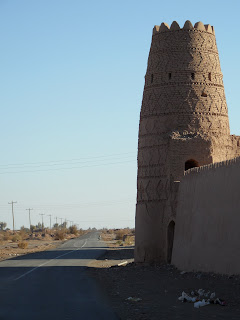 |
| Seljuk-era caravanserai tower in Shafiabad |
Over the centuries countless caravanserais were built to facilitate trade. These walled and guarded inns typically consisted of a number of vaulted rooms arranged around a square courtyard. In Anatolia, the eleventh-century Seljuks took things to a new level by ensuring that a caravan never need spend a night out in the open. A huge engineering feat, seeing that on a good day a fully loaded caravan would cover a mere twenty-five kilometres. Five hundred years later, the Safavid ruler Shah Abbas I laid the foundations for his reputation as the greatest builder of all by ordering a network of 999 caravanserais to be constructed across the Persian Empire.
Today, most caravanserais have disappeared under the sands of time. That doesn't mean the concept has vanished altogether. On the long desert road from Esfahan to Yazd lodgings are sparse though perfectly positioned. No caravanserai every twenty-five kilometres but a few lovely guesthouses, each a day's ride apart. First up was Mohammad's homestay in Toudeshk (see previous post). For the following night, he told me, there would be two options. 'After eighty kilometres you will see the remains of a caravanserai. There's an old man who cooks up simple egg dishes for truck drivers. His clothes are always dirty. He will let you stay for the night, but be careful: at night he will lie down next to you and do dirty things. But don't worry. Just show him your phone and say: police.' Although I can't deny the bit about the egg dishes sounded appealing, I decided to settle for option two: the village of Aqda, some forty kilometres down the road from the crumbling caravanserai, where a couple of paramedics were known to host the odd cyclist.
 |
| Recently restored caravanserai in Aqda |
The bane of Lonely Planet, I thought. Whoever is listed in The Book, as it's commonly known among travellers, can be certain of a steady income. His neighbour, who might be running a place just as fine, will struggle to survive. The power Lonely Planet wields was illustrated by the fact that earlier that week I had been asked to edit a letter to Lonely Planet for a well-known hotel in Esfahan. As it happened, one of the authors had witnessed an argument between a member of staff and one of the guests while doing a write-up on the place. Management feared that with a single click of a button their hotel would be wiped out of the next edition of Lonely Planet Iran, which is due to appear this summer. Needless to say, the tone of the letter was pleading, like a prisoner trying to get the king to see that a beheading might be a bit on the harsh side.
However, a lack of guests wasn't the only thing that was troubling the affable Aqda hotel manager. Everything that needed to be done had to be done alone, his Dutch companion unable to return to Iran. Dutch companion... Is his name Sebastiaan, by any chance, I asked. Several people had already told me his story. Trundling through Iran as a backpacker a few years ago, he liked it so much he decided to stay and run the Silk Road Hotel in Yazd, 'the most talked about travellers' stop in Iran,' according to The Book. The place got off to a flying start, whereupon he set up a number of activities in the Yazd area, including the project in little Aqda. Then his luck changed. Wanting to return to Iran after a short break in Holland, he was denied a visa. He hasn't been back since. God knows how much time, effort and money have gone to waste this way.
 |
| Guest number twenty-three is checking out |
My contribution to tourism in central Iran amounted to putting the Aqda hotel manager in touch with Mohammad in Toudeshk, whose network is impressive by any standard. Mohammad promised me to pay him a visit and recommend the place to his guests. I hope it will make a difference, though it seems Iran has a long way to go if it ever wants to restore the scores of travellers of the days of yore.
Hi Michael. I work at Lonely Planet and a friend passed your blog post on to me. We have a webpage that lets new businesses register their details with us: http://www.lonelyplanet.com/contact/business_listing/new.
ReplyDeleteNow, this doesn't mean that they will automatically be reviewed in the next guidebook, but their details will be passed on to the commissioning editors and authors for that area so that they can consider visiting them the next time the appropriate book is being researched. Feel free to pass it on to the hotel owner you met.
Cheers,
-- Ali L.
(not posting in any official capacity)